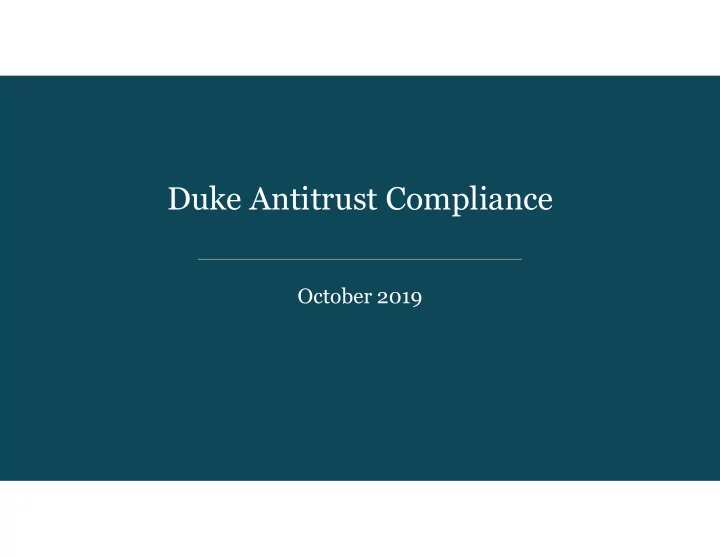

Duke Antitrust Compliance October 2019
Overview of the Antitrust Laws The antitrust laws protect free and fair competition These laws prohibit (i) agreements among multiple companies that harm competition (“ collusion ”); and (ii) improper efforts by a single company to obtain or preserve a monopoly
Agreements That Restrain Competition Agreements are judged under one of two standards: Some agreements are automatically unlawful o e.g. , collusion among competitors to fix prices or to divide customers, territories, or employees o participants may face criminal charges in these instances Most agreements are judged on “reasonableness” and likely consumer effects e.g., joint ventures, collaborations, “vertical” agreements test balances consumer benefits and competitive harms
Information Sharing Risks Exchanging information with competitors can reflect—or can be seen as—unlawful collusion collusion can be inferred from conduct Sensitive information includes: future tuition or financial aid plans or strategies current or future employee salary or benefits information bidding plans for projects or purchases Avoid sharing sensitive information without approval from counsel This includes information requests from third-parties
Duke and the Antitrust Laws While Duke is a non-profit educational institution, its conduct is still subject to the antitrust laws Duke may be seen as competing for students, faculty, patients, and other resources Duke employees are expected to comply with the antitrust laws and Duke’s Antitrust Policy and Guidelines Although a significant amount of collaboration between universities is legitimate . . . Duke must take care to comply with the antitrust laws
Ivy League “Overlap” Financial Aid The Complaint alleges that beginning at least as early as UNITED STATES DISTRICT< FOR THE EASTERN DISTRICT OF Pl 1980 and continuing to the date of the Complaint, defendants and co-conspirators conspired to restrain price competition ) UNITED STATES OF AMERICA, ) among themselves in the sa l e of undergraduate education to ) Plaintiff, ) students receiving financial aid. This conspiracy has been ) v. ) Civil effectuated through the "Overlap" group, which consists of ) BROWN UNIVERSITY IN PROVIDENCE ) financial aid officers from the defendants' and IN THE STATE OF RHODE ISLAND, ) AND PROVIDE NCE PLANTATIONS; ) co-conspirators' colleges and universities. The Overlap group ) schools ha ve made several agreements restricting the amount of financial aid they award undergraduate students. The conspiracy has had the effect of depriving students receiving financial aid and their families of the benefits of free and open pric e competition . In addition, the conspiracy has caused some students receiving financial aid and their families to pay more for college than they would have otherwise.
DOJ Early Admission Investigation 0. # Admissions In sider Justice Department Investigates Early- Decision Admissions I Focus appears to be how some colleges share information about those admitted early. Common App asks applicants to consent to the practice. By Scott Jasch i k // Apri l 9, 2018 COl\1 COM APP AMHERST 2017 EARLY DECI I ON AGREEMENT lrAtllDIIINIU"l\l,...1 • 1"11
NCAA Amateurism Rules Judge Rules Against NCAA in Federal Antitrust Lawsuit While t he ruling was a win for a group of former college basketball and football players, it may have been the best lo ss imag in able for the athletic association and its model The NC AA ca n co ntinue to limit compen sat ion th at is unrela ted t o educa ti on., a judge ruled. PHOTO: M ATT S LO C UM / A SSOC IAT ED PRESS
ANTITRUST GUIDANCE FOR HUMAN RESOURCE PROFESSIONALS DEPARTMENT OF JUSTICE A TITRUST DIVISIO FEDERAL TRADE COMMISSIO OCTOBER 2016
Antitrust Red Flags for Employment Practices r- Agreements and information exchanges among employers that compete to hire or re tain employees may be illegal. If you are a manager or hum an resource (HR) professional, antitntst concerns may arise if you or your colleagues: • Agree with another company about employee salary or other terms of compensation, either at a specific level or within a range. • Agree with another company to refuse to solicit or hire that other company's employees. • Agree with another company about employee benefits. • Agree with another company on ot her terms of employment. • Exp ress to competitors that you should n ot compete too aggressively for employees. • Exchange company-specific information about employee compensation or terms of employment with another compan y. • Patticipate in a meetin g, such as a trade association meeting, where the above topics are discussed. • Discuss the above topics with colleagues at other companies, in cluding during social events or in ot her n on -professio na l settings. • Receive documents that contain another company's internal data about employee compensation.
Duke Will Not Enter Into “No-Poach” Agreements In the Seaman settlement, Duke has agreed not to “ enter into, maintain, or enforce any agreement that restrains any person from cold calling, soliciting, recruiting, hiring, or otherwise competing for employees ” Duke may continue to make unilateral decisions not to hire from other schools There are also exceptions for agreements that are (among other things): (a) “reasonably necessary” to a “legitimate business transaction or collaboration”; (c) “narrowly tailored to affect only employees who are reasonably anticipated to be directly involved in the agreement”; and (e) in writing and identify the employees who are subject to the restraint. Contact the Antitrust Compliance Officer before you approve any “no-poach” agreement or if you become aware of any violation or potential violation of this prohibition
Duke Antitrust Resources Duke Antitrust Policy and Guidelines (ogc.duke.edu/) DOJ Guidelines for HR Professionals (www.usdoj.gov/atr) Antitrust Compliance Officer Chris Lott at (919) 684-3955
Recommend
More recommend